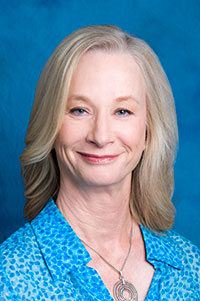Protecting patient health resulting from climate change requires coordinated efforts from physicians, health systems, and communities. Learn how Permanente Medicine is tackling this challenge.

Climbing the leadership ladder: What female physicians need to know

As I look back on my time as a young female physician building my practice, I have a few recollections of being treated differently because of being female. Whether accurate or not, my interpretation of this was simple: I was a physician, and my success should be measured by the quality of care I delivered. I didn’t acknowledge or give credit internally to any limitations and felt confident that those with bias were incorrect. In my young brain, I might have even thought they were out of touch!
What of my female colleagues? In retrospect, and not surprisingly, I realize that others experienced different levels and intensity of discrimination. Each of us reacts differently to bias depending on background and experience. Many modify their behavior in ways that waste time and energy. A career in medicine is a marathon that requires stamina and persistence, so any sapping of your energy takes a toll on performance. As many juggled the demands of marriage, motherhood, and a career, they often did it without the support of their peers or their organization.
I was lucky enough to have a wide range of colleagues, mentors, and leaders who helped me navigate these tricky waters. Along the way I learned great lessons that I’ve categorized as the three stages of my journey: the initial step into leadership, juggling family and leadership, and the challenges and rewards of senior leadership. Following are strategies I found crucial for success in each stage.
Getting there
In my experience, we must be excellent physicians before we can be taken seriously as leaders. Research bears this out, showing that medical excellence consistently emerges as the most important quality required of physician leaders.
I’ve found “soft” skills, such as communication and collaboration, to be equally important. These interpersonal skills are crucial to aspiring leaders and are ideally learned and honed early in our careers. While some have these innate talents, recognizing our gaps and developing new skills requires tremendous self-awareness.
Many women face barriers formed by unconscious bias, so it’s critical to be aware of what other people in the room are feeling. Decide what you want out of a situation—while adhering to your core values—and use this awareness to find approaches that drive the results you desire.
Avoiding a sense of victimhood or defensiveness is also important, as dwelling on barriers inhibits learning. The ability to recognize, check, and act on your emotions productively is a tall order. This was much more challenging early in my career. However, developing these good habits early on has paid dividends for many years.
Many women face barriers formed by unconscious bias, so it’s critical to be aware of what other people in the room are feeling.
When launching your career, consider the work environment carefully. Today, a newly-minted medical doctor is likely to spend at least some time employed by someone else. In fact, 47.4% of practicing physicians were employed in 2018, while 45.9% owned their practices, according to a 2018 American Medical Association physician survey.
I was fortunate to choose to practice as a Permanente physician. Providing care to the patients and members of Kaiser Permanente offered the right environment for me, aligned with my values, and supported my needs as a physician. The organization also champions diversity and women in leadership—support that helped me in my career and as a leader. You can’t get the best solutions from people without honoring that diversity—in the people around you, in your teams, and in yourself.
Finally, bear in mind the compensation associated with a chosen specialty. While most offer equal pay for men and women, long-term compensation growth is often
linked to a physician’s ability to take on leadership and thrive in that role.
Succeeding in mid-career
Ascending the leadership ladder requires tackling new challenges. That can include speaking up for yourself—and for others. It may mean confronting difficult situations in a thoughtful way. Again, acknowledge the feelings of others involved when difficulties arise. Assume good intentions and be persistent. If you encounter biases, confront them in the moment.
During this busy mid-career stage, physicians who want a family should seek a supportive work environment and be clear about their need for flexibility. As a doctor, you
cannot expect to work only the hours that your kids are in school. Patients deserve to be seen when they need to be seen.
However, to achieve work-life balance, there must be flexibility on both sides. For example, working four days a week instead of five, or covering day shifts for colleagues while they cover for you on nights and weekends, can provide much-needed flexibility.
As you juggle family and career, take care of yourself—there are a lot of people relying on you during this stage. On the home front, understand that perfection isn’t possible, regardless of your role. Give yourself permission to be “good enough.”
Embracing the joy of leadership
Moving into senior leadership roles brings a shift in job satisfaction.
As a pediatrician, I derived joy from one-on-one interaction with patients and their parents. As my leadership responsibilities grew, I saw fewer individual patients. However, I discovered other sources of gratification and growth as a leader, mentor, and coach.
While it’s true that leadership can be lonely at times, it’s also true that none of us accomplishes anything alone. Avoid insulating yourself by staying engaged with all levels of your organization. Acknowledge and celebrate the contributions and successes of your team. Cultivate relationships—inside and outside your organization—with those who can provide honest feedback, encouragement, and support.
Never view a specific position as your end goal—remain open to new challenges in whatever form they take. Moving from an established leadership role in Southern California to Executive Medical Director of The Southeast Permanente Medical Group in Atlanta took me out of my comfort zone. It created new challenges, new learning opportunities,
and new relationships. This wonderful experience has taught me much about medicine, leadership, and myself.
Finally, I encourage women at all stages of their careers to never, ever sell themselves short. Go for your dreams and goals, get help from friends and peers, and embrace the joy of leadership. As you climb the career ladder, remember to look behind you and lend a helping hand to those who are still coming up. Set an example that will foster the next generation of leaders who are crucial to the future of medicine.
Mary Wilson, MD, MPH, is president and executive medical director of The Southeast Permanente Medical Group. This post is reprinted with permission from The Journal of America’s Physician Groups Fall 2019 edition.


